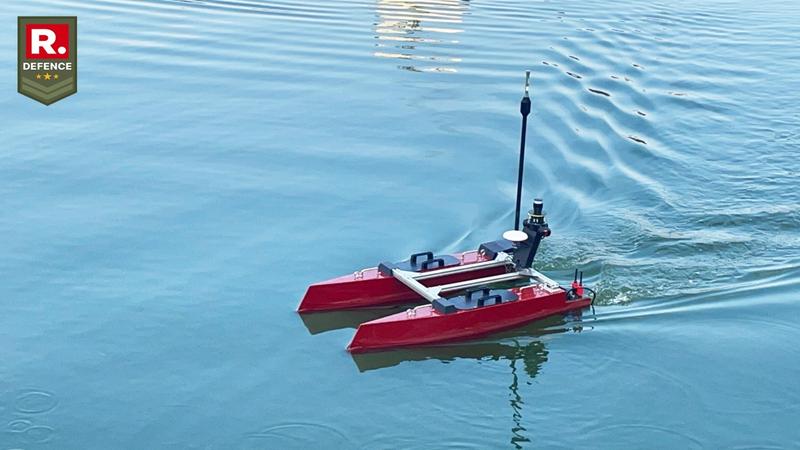Published 22:17 IST, December 5th 2024
GRSE Hands Over “Jaldoot” Unmanned Surface Vessel to DRDO amid Maritime Tech Leap
Successfully trialed in October, this state-of-the-art vessel signifies a major advancement in India's naval capabilities.

New Delhi, India - In a significant boost to indigenous defence technology, Garden Reach Shipbuilders & Engineers (GRSE), a Defence Public Sector Undertaking (PSU), handed over the “Jaldoot” Unmanned Surface Vessel (USV) to the Defence Research and Development Organisation’s (DRDO) Naval Science and Technological Laboratory (NSTL) in Visakhapatnam. The handover follows successful acceptance trials conducted from October 17 to October 21, marking a milestone in India’s maritime capabilities.
The “Jaldoot” USV, jointly designed and developed by GRSE and NSTL/DRDO, is built to carry out survey and communication missions. This state-of-the-art vessel is powered by a rechargeable lithium-ion battery and supports advanced functionalities, including waypoint navigation, station-keeping, and failsafe behaviours, ensuring operational precision and reliability.
Technological Advancements and Features
The compact and lightweight design of the Jaldoot enables it to integrate various sensors for diverse mission capabilities seamlessly. These include:
- Acoustic Positioning System: Enables tracking of Unmanned Underwater Vehicles (UUVs).
- Side Scan Sonar: Supports search-and-rescue (SAR) missions.
- 1080p HD Camera with Night Vision: Facilitates 24/7 operational readiness.
The GRSE collaborated with a domestic start-up, M/s Rekise Marine, nurturing it in the design and development of the Jaldoot, exemplifying the government’s commitment to fostering innovation under the ‘Make in India’ initiative.
A Testimony to Joint R&D
GRSE highlighted that the successful completion and deployment of the Jaldoot underscores the efficacy of joint R&D initiatives, leveraging in-house expertise and the strengths of indigenous start-ups. Speaking about the achievement, GRSE termed it a “testament to India’s growing prowess in defence innovation and self-reliance.”

Apart from GRSE, other PSUs and private players are also making strides in the USV domain. Bharat Electronics Limited (BEL) has developed a zero-emission USV designed for hydrographic surveying and coastal surveillance, which can be customized for logistics operations and kamikaze missions.
Emerging Private Innovations
Private industries, such as Sagar Defence Engineering and Dronobotics, are also exploring this segment with noteworthy advancements:
- Sagar Defence Engineering: Their autonomous surface vessel recently completed a groundbreaking 1,500-km voyage from Mumbai to Thoothukudi without human intervention, supported by the Indian Navy.
- Dronobotics’ Jalchar USV: Designed for disaster management, search-and-rescue missions, scientific research, and commercial needs, this “Drone Boat” highlights the versatility of USVs.
The development and deployment of USVs like Jaldoot and similar systems signal a transformative shift in naval operations and future warfare. With increased emphasis on self-reliance, collaborative innovation, and environmental sustainability, India’s strides in unmanned systems not only bolster national defence but also position the country as a significant player in the global maritime technology market.
As these systems evolve, they promise to redefine maritime missions, ranging from intelligence gathering and reconnaissance to disaster management and logistics, ensuring a smarter and safer future for naval operations.
Updated 22:17 IST, December 5th 2024




